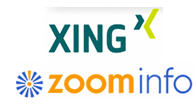Xing links up with ZoomInfo


The ZoomInfo connection will help Xing expand its membership in the U.S., and will be available to members in the fall, according to Lars Hinrichs, CEO of Xing.
Xing's main competitor in the social network of business relationships, LinkedIn, has more than four times the number of members. Xing's ZoomInfo partnership excludes LinkedIn from doing a similar deal with the business info search engine.
"The partnership gives us a great opportunity to gain access 36 million people, mostly in the U.S. LinkedIn has about 11 million members," said Hinrichs. "We are combining crawling for information and semantically generated profiles with the power of social networking, with the users generating the content. ZoomInfo has 4.5 million monthly users, who will be driving the registration process into Xing. It's a way to provide immediate value for U.S. members."
Xing members will have access to ZoomInfo profiles, and premium members earn the capability to contact the more than 18 million professionals profiled by ZoomInfo's engine. In addition, Xing members will be able to manage their own online profiles by monitoring the information captured by ZoomInfo.
Both Xing and LinkedIn will have to contend with Facebook. As Steve O'Hear points out in his blog, Facebook has become a place that combines professional and personal contacts and groups.
You see, nearly all of my Facebook requests are from professional contacts not purely social ones. (The main Facebook group I belong to is the web 2.0 group.) And with Facebook’s heritage being the college campus, it makes sense that young professionals (graduates) would start to utilize the site for more career-based networking.
Facebook’s new platform strategy also removes the friction to keep adding more functionality. If there is demand for professional features that are missing, anybody can come in and build them. Were Facebook to add even more flexible privacy controls, then LinkedIn [or Xing] might become irrelevant to non-paying users, eventually becoming less valuable to paying users.
Hinirchs doesn't believe that Facebook will affect his business. "The whole social networking area is dividing into two areas--dating and professional. You don't want to mix the two missions. Facebook will take over the social aspects and together with ZoomInfo we will go after business people worldwide," Hinrichs said. "Facebook is getting older people by broadening out, but the context is different. You are not going to do business on Facebook."
I don't think that Facebook, or Facebook users, will be content with just the more casual, social networking piece. I would also expect Xing and LinkedIn to build applications that hook into Facebook as a way to bridge the two worlds. The more pure focus on enhancing business relationships and career development will differentiate them for a while from Facebook, which will likely surpass 100 million members early next year.
Xing, LinkedIn, Facebook, MySpace, Bebo and others pioneering the social Web are still in the early stage of colonization, and focused on scaling fast. However, with a pool of billions of people who haven't yet created a profile, the opportunity is great, the cost low and the field wide open.